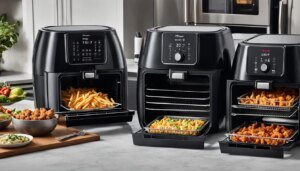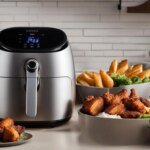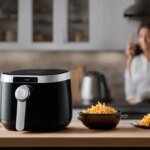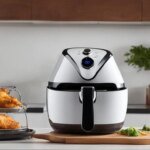Email: connect@airfryeraid.com
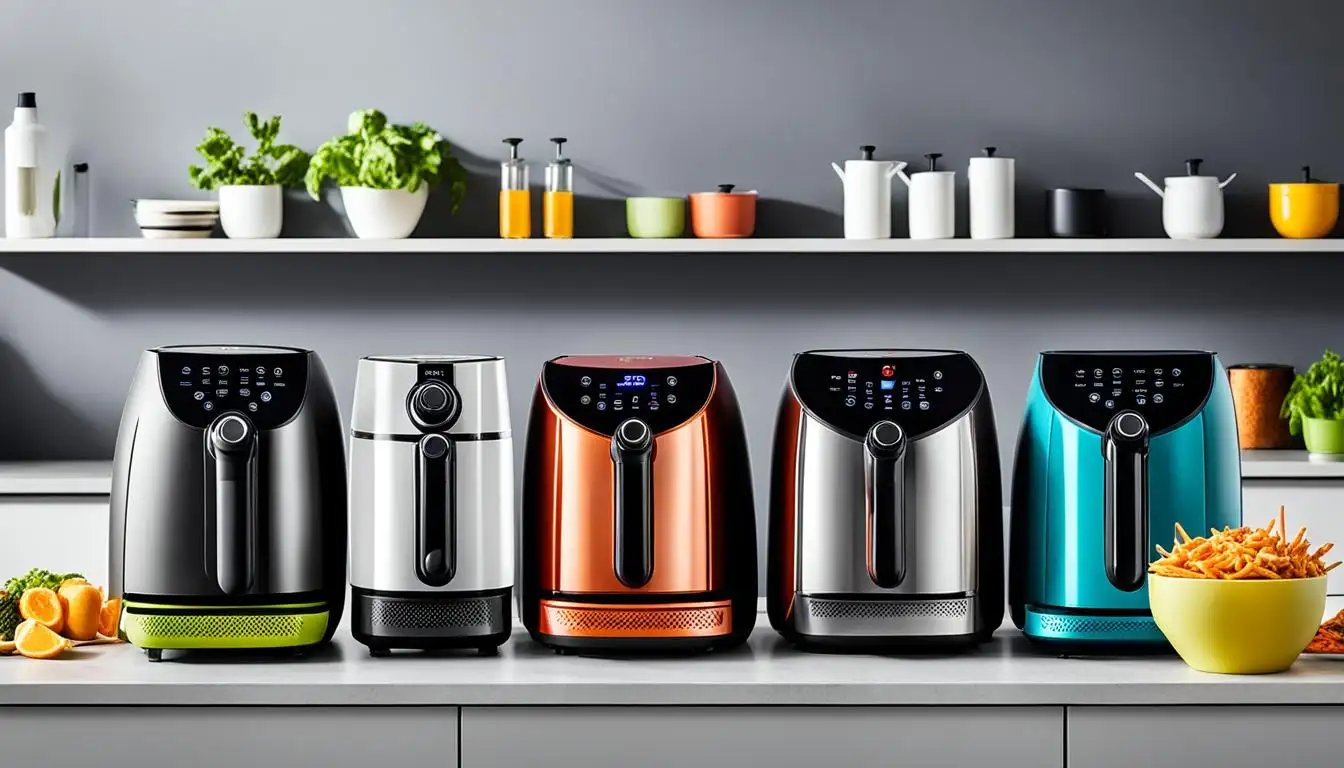

In this article, I’ll provide a balanced overview of the pros and cons of using an air fryer, so you can make an informed decision about whether it’s the right cooking method for you.
Air fryers have become increasingly popular in recent years as a healthier alternative to deep fryers. They use hot air circulation to fry food, giving it a crispy texture without the need for excessive oil.
But are air fryers really worth the hype? Let’s look into the pros and cons of this appliance to find out.
Key Takeaways:
- Air fryers use hot air circulation to cook food with minimal oil.
- They provide a healthier alternative to deep frying and produce crispy results.
- Air fryers cook food faster than conventional ovens and offer versatile cooking options.
- Considerations include changes in texture and taste, limited cooking capacity, a learning curve, cost, kitchen space, maintenance, and compatibility with certain foods.
- Air fryers can help reduce fat consumption and offer convenience in the kitchen.
- Air fryers contribute to energy efficiency and can help reduce carbon footprint compared to deep frying.
Understanding Air Fryers And How They Work
What Defines An Air Fryer?
An air fryer is a compact kitchen appliance that cooks food quickly and evenly by using hot air circulation. It eliminates the need for excessive oil and achieves a crispy exterior on various foods, such as fries and chicken wings, without deep frying.
The Hot Air Circulation Cooking Method
- Air fryers employ a hot air circulation system to cook food.
- The appliance rapidly heats the air inside and circulates it around the ingredients, creating a convection effect.
- This convection effect results in a crispy texture, similar to deep-fried food, but with significantly less oil.
Comparison With Conventional Ovens And Deep Fryers
- Air fryers offer a healthier cooking option compared to deep fryers, as they require less oil.
- By utilizing the hot air circulation method, air fryers can achieve similar results to deep frying without the excessive use of oil.
- Air fryers cook food faster than conventional ovens, making them an energy and time-saving option for busy individuals.
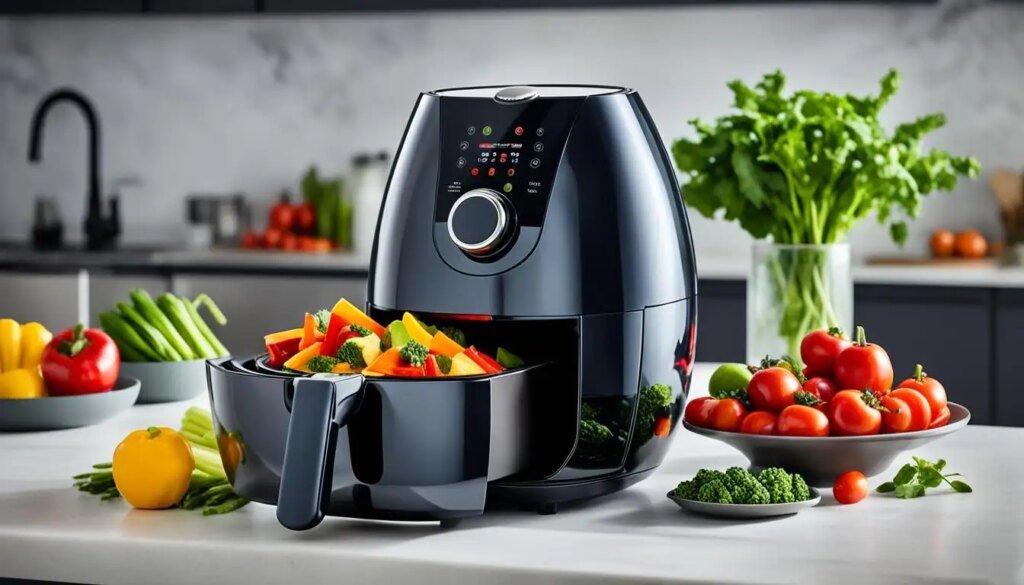

Health Benefits Of Using An Air Fryer
Air frying offers a healthier cooking method that promotes a balanced and nutritious diet. By using less oil, air fryers reduce overall fat consumption and calorie intake compared to traditional frying methods.
Air frying can result in healthier versions of popular fried foods, making them a more nutritious option. The cooking process in an air fryer also helps retain the nutrients in the food, resulting in healthier and more flavorful meals.
Unlike deep frying, which requires large amounts of oil, air fryers use hot air circulation to achieve a crispy texture with minimal oil. This means you can enjoy your favorite fried foods without the guilt of excess fat and calories.
| Health Benefit | In Details |
|---|---|
| Reduced Fat Consumption | Air fryers use less oil, resulting in lower fat intake compared to deep frying. |
| Lower Calorie Intake | By reducing the amount of oil used, air frying can help decrease overall calorie consumption. |
| Healthier Versions of Fried Foods | Air fryers allow you to enjoy crispy and delicious fried foods with less oil, making them a healthier alternative. |
| Retention of Nutrients | The cooking process in an air fryer helps retain the nutrients in the food, resulting in healthier meals. |
The Convenience Factor: Time-Saving & Versatile Cooking
Air fryers offer incredible convenience in the kitchen, making cooking a breeze with their time-saving features and versatile cooking options.
1. Versatility: Wide Range Of Cooking Options
- Air fryers is their ability to cook a wide range of foods: from crispy fries and perfectly golden chicken wings to tender roasted vegetables and even delectable baked goods.
- With just one appliance, you can whip up a variety of dishes, eliminating the need for multiple cooking tools and saving precious kitchen space.
- Not only can you enjoy your favorite fried foods guilt-free, but you can also explore new recipes and get creative in the kitchen. The versatility of air fryers opens up a world of culinary possibilities.
2. Speed: Quick Cook Time Compared To Ovens
- Air fryers can cook food much faster than ovens, thanks to their rapid heating technology and powerful air circulation. Unlike traditional ovens that take longer to preheat and cook, air fryers are designed for efficiency.
- Whether you’re in a rush or simply want to enjoy a meal without waiting too long, air fryers will deliver. In just minutes, you can have crispy, flavorful food ready to be enjoyed.
3. Practical Choice: Capacity And Kitchen Space
- Air fryers come in different sizes and have varying cooking capacities, so you need to choose one that suits your needs. Assess the amount of food you typically cook and make sure the air fryer can accommodate it. Just don’t overcrowd it.
- In addition to capacity, kitchen space is another crucial factor to consider. The appliance should have enough clearance on all sides to allow proper ventilation and prevent overheating.
- By taking into account the capacity of the air fryer and the available kitchen space, you can make an informed decision and find the ideal air fryer that meets your needs and fits seamlessly into your kitchen setup.
Air Fryer Cons: Weighing Your Options
It’s important to weigh these disadvantages of air fryers against the advantages and consider your specific needs and preferences before deciding whether an air fryer is suitable for you.
1. Changes In Texture And Taste
One of the main disadvantages of air frying is the potential for changes in texture and taste compared to traditional frying methods.
- Since air fryers use hot air circulation instead of oil for cooking, the results may not be identical to deep-fried foods.
- The texture may be slightly different, and the taste may vary. However, many people still find the taste of air-fried food to be equally delicious, albeit with a different flavor profile.
- It’s essential to consider your personal preferences when weighing this aspect.
2. Limited Cooking Capacity
Air fryers come in different sizes, and their cooking capacity may be limited compared to a traditional oven or an air fryer toaster oven combi.
- Depending on the size of the air fryer, you may need to cook food in batches.
- It can be time-consuming if you’re preparing a large meal or cooking for a larger group of people.
- It’s better to assess your typical cooking needs (including the family size or number of people you’ll be cooking for) and choose an air fryer that can accommodate them.
3. Learning Curve
- While air fryers are generally easy to use, there may be a learning curve involved, especially if you’re new to this cooking method.
- You may need to experiment with cooking times and temperatures to achieve the desired results for different foods.
- This trial-and-error process may take some time and practice before you become comfortable with using the air fryer effectively.
4. Cost
- Air fryers can be more expensive upfront compared to traditional deep fryers or other stovetop frying solutions.
- The cost can vary depending on the brand, size (capacity), and features of the air fryer.
- If you plan to use the air fryer frequently, there may be ongoing costs for electricity usage.
- Consider your budget and weigh the cost against the potential benefits and convenience of using an air fryer.


5. Kitchen Space
- Another consideration is the amount of kitchen space required to accomodate an air fryer.
- While they are generally compact appliances, they still need clearance on all sides to allow proper ventilation to prevent overheating.
- Ensure that you have enough counter space or storage space for the air fryer when it’s not in use.
6. Maintenance And Cleaning
- Like any kitchen appliance, air fryers require regular cleaning and maintenance to ensure optimal performance and longevity.
- Depending on the model, cleaning an air fryer can involve disassembling various parts and following specific instructions.
- Familiarize yourself with the cleaning process and factor in the time and effort required for maintenance.
7. Not Suitable For All Foods
- While air fryers offer versatility in cooking options, there are certain foods that may not be suitable for air frying.
- Foods with a high moisture content or foods that are very delicate may not achieve the desired results in an air fryer.
- Consider the types of foods you commonly cook and whether they are compatible with air frying.
8. Noise Level
- Air fryers can produce some noise during operation due to the fan, heating elements and the beeping sounds that indicate steps in the cooking process.
- While the noise level is generally not excessive, be aware of this factor if you have a preference for quieter kitchen appliances or if noise sensitivity is a concern for you.
9. Dependency On Electricity
- Air fryers rely on electricity for operation, so if there is a power outage or electrical issues, you won’t be able to use the appliance.
- This dependency on electricity may be a disadvantage in certain situations or environments where power supply is unreliable.
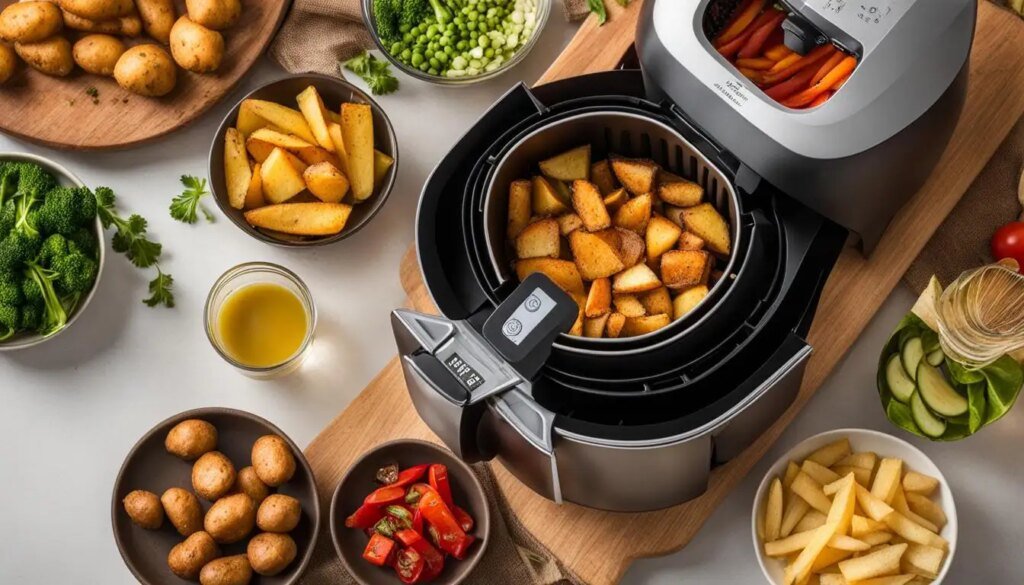

Sustainability Consideration: Environmental Impact Of Air Frying
There are several positive aspects to consider in terms of sustainability. From reducing waste to conserving energy, individuals are making conscious choices to minimize their environmental impact.
Energy Efficiency Of Air Fryers
- Air fryers are known for their energy efficiency, compared to conventional ovens.
- This means that using an air fryer not only saves you time and effort in the kitchen, but it also helps reduce your overall energy consumption.
- By opting for a quality and durable air fryer, you are making a sustainable choice that contributes to a greener future.
Reducing Carbon Footprint With Air Frying
Another environmental benefit of air frying is its ability to reduce your carbon footprint.
- Air fryers use a fraction of the oil typically required for deep frying, resulting in less waste and lower greenhouse gas emissions.
- The cooking process of air frying produces less smoke compared to traditional frying methods, further minimizing its environmental impact.
- By embracing air frying as a cooking method, you are actively participating in reducing your carbon footprint and endorsing a more sustainable lifestyle.
- Small changes like these can make a significant impact on the environment in the long run.
| Environmental Impact | Air Frying | Deep Frying |
|---|---|---|
| Energy Consumption | Low | High |
| Oil Usage | Minimal | Significant |
| Greenhouse Gas Emissions | Low | High |
Bottom Line
In summary, air fryers offer a convenient and healthier cooking option for those looking for enjoying favorite fried foods with less guilt of fat and calories consumption.
Air fryers provide versatility, faster cooking times, and energy efficiency, making them an ideal choice for busy individuals seeking quick and nutritious meals.
However, it’s essential to consider factors such as changes in texture and taste, limited cooking capacity, maintenance, and the space and usage dependancy when deciding whether an air fryer is suitable for your personal needs and preferences.
Ultimately, weighing the balanced overview of the pros and cons of air fryers will help you make an informed decision about incorporating an air fryer into your cooking routine.
Happy air frying!
AirfryerAid
